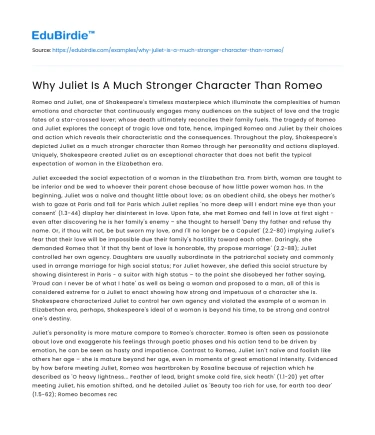Romeo and Juliet, one of Shakespeare's timeless masterpiece which illuminate the complexities of human emotions and character that continuously engages many audiences on the subject of love and the tragic fates of a star-crossed lover; whose death ultimately reconciles their family fuels. The tragedy of Romeo and Juliet explores the concept of tragic love and fate, hence, impinged Romeo and Juliet by their choices and action which reveals their characteristic and the consequences. Throughout the play, Shakespeare's depicted Juliet as a much stronger character than Romeo through her personality and actions displayed. Uniquely, Shakespeare created Juliet as an exceptional character that does not befit the typical expectation of woman in the Elizabethan era.
Juliet exceeded the social expectation of a woman in the Elizabethan Era. From birth, woman are taught to be inferior and be wed to whoever their parent chose because of how little power woman has. In the beginning, Juliet was a naïve and thought little about love; as an obedient child, she obeys her mother's wish to gaze at Paris and fall for Paris which Juliet replies 'no more deep will I endart mine eye than your consent' (1.3-44) display her disinterest in love. Upon fate, she met Romeo and fell in love at first sight - even after discovering he is her family's enemy – she thought to herself 'Deny thy father and refuse thy name. Or, if thou wilt not, be but sworn my love, and I'll no longer be a Capulet' (2.2-80) implying Juliet's fear that their love will be impossible due their family's hostility toward each other. Daringly, she demanded Romeo that 'If that thy bent of love is honorable, thy propose marriage' (2.2-88); Juliet controlled her own agency. Daughters are usually subordinate in the patriarchal society and commonly used in arrange marriage for high social status; For Juliet however, she defied this social structure by showing disinterest in Paris - a suitor with high status – to the point she disobeyed her father saying, 'Proud can I never be of what I hate' as well as being a woman and proposed to a man, all of this is considered extreme for a Juliet to enact showing how strong and impetuous of a character she is. Shakespeare characterized Juliet to control her own agency and violated the example of a woman in Elizabethan era, perhaps, Shakespeare's ideal of a woman is beyond his time, to be strong and control one's destiny.
Save your time!
We can take care of your essay
- Proper editing and formatting
- Free revision, title page, and bibliography
- Flexible prices and money-back guarantee
Juliet's personality is more mature compare to Romeo's character. Romeo is often seen as passionate about love and exaggerate his feelings through poetic phases and his action tend to be driven by emotion, he can be seen as hasty and impatience. Contrast to Romeo, Juliet isn't naïve and foolish like others her age – she is mature beyond her age, even in moments of great emotional intensity. Evidenced by how before meeting Juliet, Romeo was heartbroken by Rosaline because of rejection which he described as 'O heavy lightness... Feather of lead, bright smoke cold fire, sick heath' (1.1-20) yet after meeting Juliet, his emotion shifted, and he detailed Juliet as 'Beauty too rich for use, for earth too dear' (1.5-62); Romeo becomes reckless and trespass into Capulet's house disregarding how dangerous it is showing how immature and impractical Romeo can be. Juliet, however, is aware of the foolhardiness of their love, and she admitted that this relationship is “Too rash, too unadvised, and too sudden” (2.2-86). Shakespeare's characterized Juliet to be more realistic as opposed of Romeo impassioned personality to not only balance each other but also present his ideal of a woman – decisive and intelligence.
Some argue that Romeo is the Tragic Hero in Romeo and Juliet for being gentle, disinterest in violence between his family fuel and shows loyalty to his friends as well as being a sensitive person with flaws such as overly expressive which made him likable to the audience; however, Juliet is the person who deserves the title of being a tragic hero more. Romeo's fatal flaws is his impetuosity, he does not think of his action thoroughly which result in his own death. Juliet is worthy to be appraised as a tragic hero; she is strong-willed, Juliet is willing to go far to be with Romeo, she preserves her love and chastity to Romeo 'without fear or doubt, to live an unstained wife' (4.1-214) but in the end she still decides to die without regret to be with Romeo. Juliet's tragic flaws is her loyalty to Romeo, she is willing to sacrifice her life to be with him. Shakespeare purpose of creating tragic hero to earn the audience's sympathy as well as their fatal flaws which led to their death; like Juliet, her only flaws is her loyalty to Romeo.
From a youth whom is inexperienced on the subject of love bloomed into a mature and witty woman doomed by her tragic fates. Juliet not only exceed the Elizabethan expectation but also becomes a tragic hero. Surpassed Romeo, she is indeed a much stronger character than just a 14 year old girl. Juliet is undoubtedly an extraordinary character intended by Shakespeare to showcase his ideal inner strength of a woman beyond his time.






 Stuck on your essay?
Stuck on your essay?

